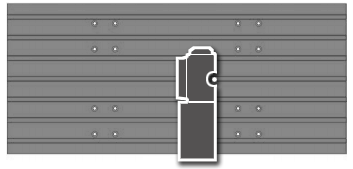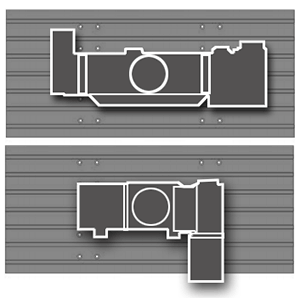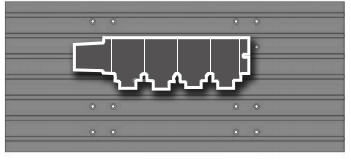Whitewall Choppers
Whitewall Choppers designs and manufactures an amazing variety of handsome, high-quality parts and accessories for Victory and Indian Motorcycles. The small manufacturing company has an outstanding reputation for excellence, design, and production. Whitewall’s six employees and two Haas vertical machining centres meet production schedules expected from a much bigger shop, while maintaining high standards of quality.

“I’ve always loved to ride motorcycles, ATVs – anything with a motor,” explains Whitewall owner Derek Hicks. “I used to race motorcycles, 600 Super Sport road racing, but when I moved back to the east coast, I decided that I wasn’t going to do it anymore. I had recently married and was attempting to settle down, so I sold all my bikes, and for about three years, I did not ride at all.
“When you love to ride, it’s not a passion that can easily be put to rest. One day, I told my wife that I wanted to buy another motorcycle,” says Derek. “She understood. But the local Harley store wouldn’t give me a good deal, so I started looking for something else. When I saw a Victory Highball, I immediately fell in love. I took a test ride – and bought one.”
But his wife did not feel comfortable riding on a pad on the fender, so Derek tried to find something to support her back and help her feel like she was not going to fall off the bike.
“I scoured the Internet, and there was only one sissy bar available for a Highball,” says Derek. “I didn’t like the way it looked, so I handmade a sissy bar of twisted metal – the old-fashioned way. It looked good, and everyone kept asking about it.” Derek made a few and they sold quickly. So he made some more, and they sold quickly, too.

Encouraged by the success of the sissy bars, Derek designed a lowering link that attaches the shock assembly to the swing arm. Adjusting the link allows the bike to be raised or lowered. He had a local machine shop make the parts for him, and he immediately started selling them. Soon, he decided to make them himself.
“Not long after that, I bought a Haas VF-2, about the same time I was retiring from the Navy,” Derek explains. “When I got the mill, the HFO technicians set it up in my 20- by 24-foot residential two-car garage – a tight fit, to say the least.
“When I got set up and running, I had one week to get parts ready for a motorcycle show,” he continues. “I knew nothing about CAD/CAM or running a machine.”
But a week after a session with the Haas trainer, he made some engine covers and was off to the show.
Now, Derek’s shop is 4000 square feet, and he has a Haas VF-6 vertical machining centre, along with his original Haas VF-2. And the business is growing. Getting the most out of his machines is a big reason for his success.

“There are several reasons that we went with Haas,” Derek points out. “Price was a big consideration starting out, and I feel you get a lot of machine for the money with a Haas. We can have more machines with spindles turning for a lower cost and greatly increase our productivity.
“And quickly learning a new Haas machine is easy,” he continues. “It is the same interface from the VF-2 to the VF-6, so there’s less time spent in training, and we maintain a higher degree of proficiency.
“I’m a big believer in using machines to their limit,” adds Derek. “If you have the rpm, use it. These machines will cut way, way faster than people think they will. We routinely cut at the feed limit. I remember one guy telling me when we first started that when you get to 150 ipm, you are flying. I wish he could see us now! And when it comes to good finishes, we really utilize the time we have saved roughing a part. We slow it down for the premium finishes on our parts, and we have a few proprietary tricks.
“Lowering setup time is extremely important to keep machines running to the maximum extent,” he continues. “Electronic probing allows us to quickly set machine parameters when we transition from machining one part to another part. It is software-driven and easy to use.
“And we use 4th-axis machining,” Derek says. “It’s essential to making some of our high-detail 3D parts. Using our Haas HRT210 rotary table, we can mill intricate designs into the sides of our parts, making every side a work of art.
“We also post-machine most of our products, producing a contrast cut for a premium finish,” Derek points out. “For post-machining, repeatability is essential. It is important to realign our parts back on our workholding. Electronic probing quickly gives us the measurement precision to achieve that repeatability.
“We do all design work and the CAD/CAM work in-house, and I work on every project,” he explains. “I am very hands-on. I decided that we were going to be the premium manufacturer of Victory and Indian motorcycle parts – and we are. It was all vision and persistence. I was determined, and knew where I wanted our company to go.
“We also designed and built the 30″ tree for the big-wheel bike pictured on the Whitewall Choppers home page – one of only six in the world, and the only one with the correct steering geometry. The right rake and trail are extremely important,” Derek explains. “Getting it right was a challenge, but it works great. The steering is not heavy in the turns, and it really looks terrific!”
But Derek is not content with designing and making only motorcycle accessories. He also produces his own designed and built firearms – branded Lead Star Arms. All the Lead Star products are machined from billet to allow custom features on each firearm.
“Some of the most complicated parts we make are the gun parts,” Derek says. “And the best part is they are affordable.”
Whitewall Choppers, LLC is a testament to finding manufacturing success through hard work, ingenuity, and a commitment to top quality.
Of course, a little Haas CNC technology always helps.




